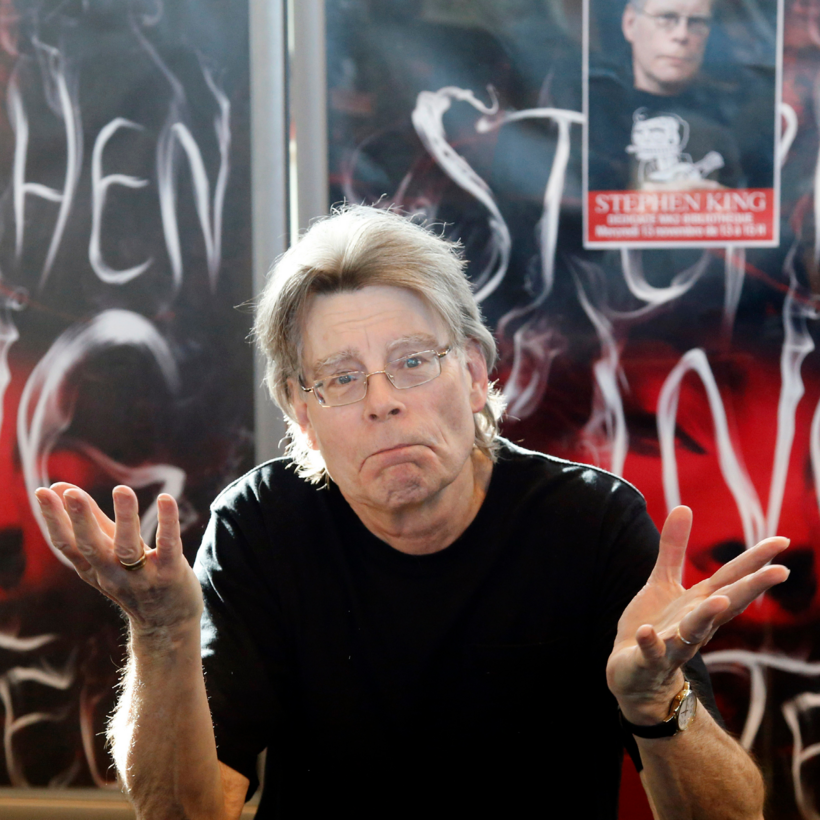I want to ask Stephen King something he’s never been asked before.
“I present a show called Pointless, and once we gave 100 people 100 seconds to name as many Stephen King novels as they could. I wondered if you could guess your top three best-known novels in the UK?”
“Hmm,” says the author. “It? Maybe Carrie?”
“It and Carrie were No 1 and No 3. Can you get No 2?”
King thinks for a while about what his second most famous book might be. He eventually looks up, beaten, and so I tell him. No 2 was The Shining.
“Oh, wow!” he says. “The Shining, I forgot that.”
And that seems a good place to start. King’s career has been so extraordinary, so packed with hits now woven into the public consciousness, and with books that mean so much to so many, he is able to forget, however briefly, that he wrote The Shining. His books have sold more than 350 million copies and been adapted into countless films and television series — and he is prolific. Carrie was his first published novel, in 1974, and his latest, Fairy Tale, will be his 65th.
Now, at 74, he has won the Sunday Times Award for Literary Excellence. Past winners include Ted Hughes, Seamus Heaney and Elena Ferrante.
King laughs at my suggestion that readers would say he is our greatest living writer. He is wrong, of course, but what sort of man would he be if he simply nodded in agreement?
“But if we were to do a poll of esteemed critics, do you think they would also say that?” I ask. “No, I don’t think they would say that at all. Greatest living writer if you polled critics? Who is the guy who wrote Atonement? Ian McEwan. On this side of the Pond Cormac McCarthy might get the votes but there are a lot of writers who can write rings around me. But I’m happy with what I do, and it’s wonderful to win the award. It’s better to win awards than to see your name in an obituary column.”
He is prepared to admit he is good at some things, for example visualizing scenes. “Bill Thompson, who was my first editor, used to say: ‘Steve has a projector in his head.’ I’ve always been good at visualizing forward movement, action, narration. Scenes where people are afraid and running, or they’re in combat, or they’ve got a suspenseful situation. Those scenes I see very clearly.”
“It’s better to win awards than to see your name in an obituary column.”
I am about to ask if there are areas where he feels he’s not as good as other writers. But, as always, King is a step ahead. He tells me a critic once told him that, as a rule, he doesn’t describe people.
“I said: ‘Well, no, because I’m inside them. I might describe them if they went by a mirror or if they had to stop.’ For instance, I know that Holly Gibney [from the Bill Hodges trilogy] is now going grey because I saw that in a mirror. And another thing I don’t do as a rule is to describe the clothing that people are wearing. I don’t really care. I’m not a clotheshorse myself.”
I’m the same — my editors always ask what my characters look like and I say: “He just looks like some guy, I guess.”
“Some guy, yes. Yes.”
“The key to writing is sitting down in the chair and starting. What is your relationship with sitting down in the chair?”
“It’s hard. It’s hard to start, OK? I always think: ‘I’ve got this beautiful idea in my head.’ Boom! It’s right there. But I also know that when I sit down to write, when I download from my head to the page, it’s not going to be as good. I used to say that I sit down and I pick up this dead fish and say: ‘How are you smelling today, dear?’ ”
“However bad it is, though, you still sit down the next day?”
“Richard, the thing is, if I wasn’t doing this between the hours of 8am and noon, what would I be doing? When I’m between projects I have this tendency to just sort of flitter around the house. I will put things in boxes and finally my wife will say: “Why don’t you go write something?”
“I used to say that I sit down and I pick up this dead fish and say: ‘How are you smelling today, dear?’ ”
King is at home in Maine — he doesn’t fly — where he lives with his wife, Tabitha. She’s a fellow author whom he met at university. They have a daughter and two sons and have been married for 51 years. King started writing as a child, selling stories to friends. His father was a traveling vacuum cleaner salesman who fought in the Second World War and left his mother when King was two years old.
He has written that “writing makes my life a brighter and more pleasant place”. This was particularly true in 1999, after a near-fatal accident. King was hit by a van while out for a walk. His leg fractured in nine places, he had a collapsed lung, injured scalp and a broken hip. After five weeks of operations, he began writing again — his memoir came out of that time.
The pleasure he takes in writing leads us neatly on to King’s magnificent new book, Fairy Tale, a doorstop chronicle of small-town America, and the battle between good and evil. Classic King, and clearly written with joy. The origin myth is that at the start of lockdown he decided to write something that would make him happy.
“That sounds about right,” he says. “The British have a phrase that I absolutely love. There’s a suspense novelist named Robert Goddard and he won this award, and I’ve never forgotten it, called the Thumping Good Read. What I thought I would like to do was write a thumping good read. The idea was that I would do something that would make me happy and take me away from Covid and Trump, politics and everything else that I would fall into every day. Pretty much that’s what happened.”
He is one of the best writers on childhood and teenagers, which continues in Fairy Tale — the main character is a 17-year-old boy called Charlie Reade. But he says that accessing his childhood self to write is getting more difficult. “I had to ask some questions of my grandsons and really work my imagination. I think that the central character and the emotional makeup don’t change too much from generation to generation, but there’s a whole new world out there of social media, and I had to work to put Charlie in that context.”
“The idea was that I would do something that would make me happy and take me away from Covid and Trump, politics and everything else that I would fall into every day.”
What’s his take on social media? “It’s a poison pill. I mean, I think it’s wonderful, for instance, that in the wake of George Floyd’s death, his murder by police, that you could muster via social media protests in cities across America and around the world. But on the other hand, it’s social media that has magnified the idea that the election was stolen from Donald Trump. And there’s millions of people who believe that, and there are millions of people who believe that the Covid vaccinations are terrible things. Some of the things are good, some are not so good, and some are downright evil.”
Over here I think some people worry about a rise of Fascism in America, but King says it is “easy to overestimate” that. “There is a strong right wing, a political right wing in America, and they have a megaphone in some of the media. They’re not Fascists but they’re hard right-wingers. They’re certainly climate change deniers, so that is a real problem. But, again, it’s the stuff that’s crazy like QAnon that gets the press. You have to remember that Hillary Clinton beat Donald Trump by three million votes [in the popular vote] and that Biden beat Trump by seven million votes.”
King has always written about evil in different forms, but that is offset by him also always writing about human decency. “I think that most people are good,” he says. “Most people will give you the shirt off their back. There’s a story about an American politician named Gerald Ford who was briefly president after Nixon resigned. People used to say about Ford — this was when he was in the House of Representatives — if he was walking to the Capitol and he saw a hungry child in a doorway he would give that child his lunch and then go on to the House and vote against the school lunch program and never see the contradiction. And I think that that’s true of most Americans.
“I think that most people are good. Most people will give you the shirt off their back.”
“I happen to think that Trump was a horrible president and is a horrible person. I think he actually engaged in criminal behavior and, certainly, I felt that he was a sociopath who tried to overturn the American democracy not out of any political wish of his own but because he could not admit that he had lost.
“So, I don’t really understand the people who continue to support him, but I do understand that a guy driving a pickup truck covered with Trump and NRA stickers — you know, take my rifle when you pry it from my cold, dead fingers — would stop and pick up a stranger if he was in a rainstorm and say: ‘Where you going, buddy?’
“That guy might go out of his way to take him there because people as individuals are good. I think sometimes when they get to be a political group that can be a problem.”
My time with King is almost done, and I want to ask him one final question on behalf of writers everywhere. There are people right now writing their first book, and their secret dream is that 50 years later they will have sold 350 million books and they’ll be beloved around the world. Having lived that secret dream, does King think it is all it’s cracked up to be? I’m glad King’s answer goes the way it does.
“Yeah, it is. It’s great that I can support my family by doing something that I love. It’s great that I’m able to utilize the talent that was given to me and write stories that make people happy.
“When I’m writing, I’m all about myself and about the reader, so that’s a great thing to have. I won’t say that I never in my wildest dreams dreamt of huge amounts of success, but what I really wanted was to be able to do it for a living. The rest has just been what us Americans call gravy. It’s all gravy now.”
Fairy Tale, by Stephen King, will be available from Scribner beginning September 6
Richard Osman is a TV presenter, producer, comedian, and the author of The Thursday Murder Club series


